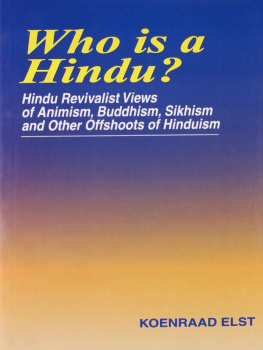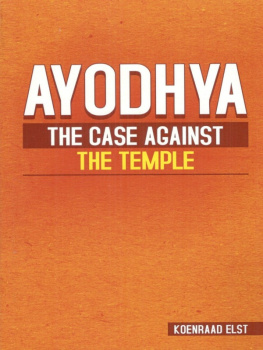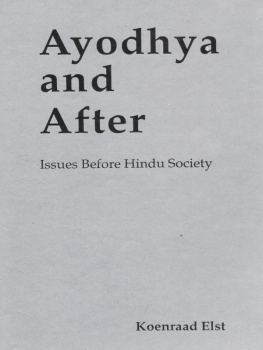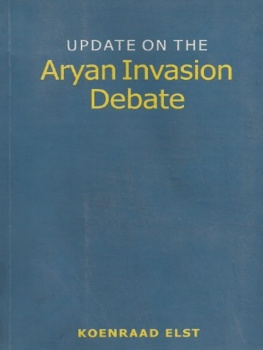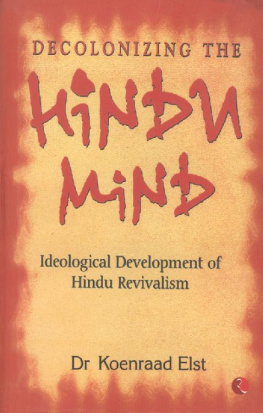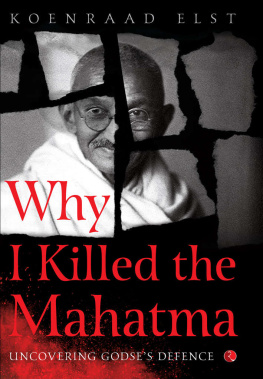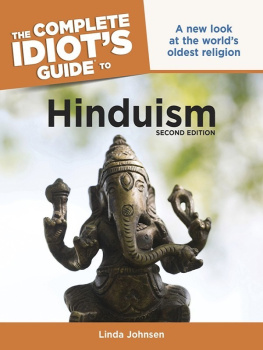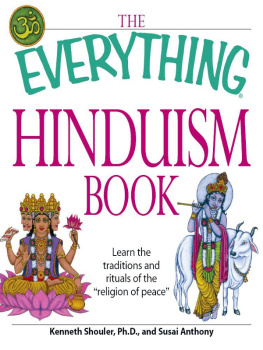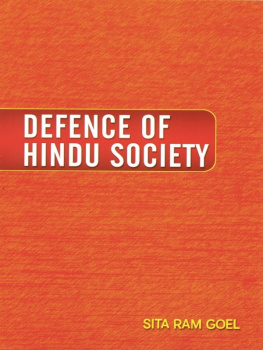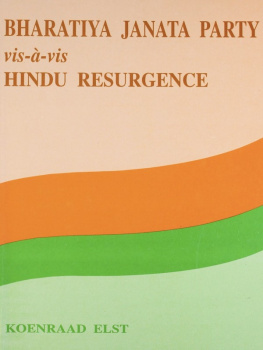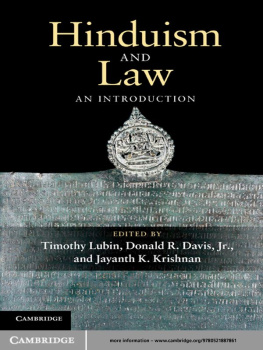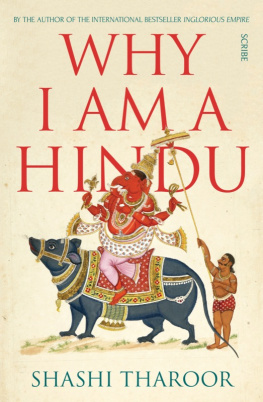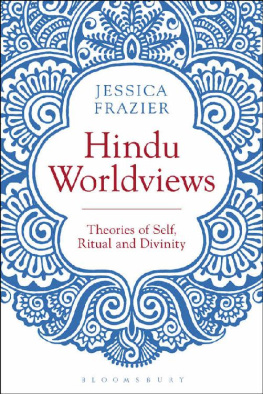Foreword
This book contains a part of my Ph.D. thesis, updated and adapted for general publication. It can best be read in conjunction with the main part of the thesis, now in print under the title *Decolonizing the Hindu Mind*.
My thanks are due to Mrs. Yamini Liu, Mr. Gopi Maliwal, Mr. Krishan Bhatnagar, Mr. Pradeep Goel, Mr. Satinder Trehan, Dr. Tushar Ravuri and Mr. Vishal Agarwal, as well as to the late Prof. Kedar Nath Mishra. But any mistakes are of course due only to my own oversight. Corrections and other feedback are welcomed.
All Souls Day (2 November), 2001 KE
PO Box 103, B-3000 Leuven-3, Belgium
email: koenraadelst@hotmail.com
1. Credal Definitions
The question is, said Alice, whether you can make words mean so many different things.
A lot of ink has flowed over the question how to define Hinduism. There is no other religion for which the question of definition is so difficult. A Roman Catholic could be defined as a person who is baptized by a priest ordained within an apostolic succession going back to Jesus, and who accepts the Nicean Creed and the authority of the Bishop of Rome. A Muslim is defined by the Muslims themselves as one who has affirmed the Islamic creed: that there is no god beside Allah and that Mohammed is Allahs prophet. A Buddhist is one who has taken the triple refuge into the Buddha, his teachings and his community. But there seems to be no accepted definition of a Hindu, neither one sanctioned by Hindu tradition nor one on which the scholarly community agrees.
Yet, for a Hindu movement the choice of a good definition may be a very consequential matter. In this book, we will see how the Hindu Revivalist movement since ca. 1875 has dealt with the question: Who is a Hindu?
1.1. Vedic Hinduism
According to Ananda Coomaraswamy, the literature of Indian thought, apart from Buddhism as interpreted by Buddhists, exhibits a continuous development, and knows no acute crises; or rather, the real crises-such as the identification of all gods as one, and the development of the doctrines of emancipation and transmigration-are not determined by names and dates, they were not announced as the Dharma of any one teacher, and they are only recognized in retrospection. Here there is a gradual process of thinking aloud, wherein by stripping the self of veil after veil of contingency there is nothing left but the Abyss which is not so, not so, the Ground of unity. From animism to idealism there is direct development, and it is for this reason that we meet with primitive terminologies invested with a new significance; moreover the old strata persist beneath the newest layers, and thus it is not only primitive terms, but also primitive thoughts which persist in the great complex that we speak of as Brahmanism.
This way, Hinduism cannot be caught in a criterion defining a specific stage of human religious development. Rather, like an individual human being (or like a nation), it represents a continuous identity through very different stages, and carrying the memory and the remains of all these stages along. For this reason, it is very difficult to formulate an essentialist definition of Hinduism, of the type: Is Hindu, he who satisfies the following criteria:... Even more difficult is, to catch Hinduism in doctrinal criteria: Is Hindu, he who believes the following truth claims:...
The variety in the means is a valuable contribution, because it explicitates what is often only a tacit assumption presupposed in most Hindu teachings. The acceptance of many approaches to the ultimate truth is indeed a distinctive characteristic of Hinduism, distinguishing it from the exclusivism intrinsic to Christianity and Islam.
Yet, this reading may be too optimistic: perhaps disagreement about the means would be a better description than variety in the means. Thus, many of the Sants of the Bhakti movement (Kabir, Nanak, Chaitanya) extol repeating the God-name as the means to Liberation and explicitly denounce both rituals and ascetic practices as false ways. Hindus have only agreed to disagree and not to interfere with other peoples practices eventhough these may be considered as deceptive paths leading nowhere. It is perhaps in this sense that Hindus could accept the presence of Christians and Muslims as much as that of rival Hindu sects, because all of them, i.e. both non-Hindus and Hindus of certain rival schools, are considered as being equally in the wrong. At any rate, Hindu tradition has an acute sense of true and false (hence a lively culture of debate), and it does not attribute equal truth to Hindu and non-Hindu, nor even to different Hindu schools of thought.
The assumption that all roads lead to the same goal is typical for modern (urban and Western-oriented) Hinduism as propagated by Swami Vivekananda and numerous more recent Gurus. Thus, in his highly critical account of the specificities of Renaissance, English-speaking, eclectic, basically anti-Sanskritic, pamphletistic neo-Vedanta, including its tendency to uncritical synthesis, the late Agehananda Bharati remarks: Patanjalis yoga is for people who have accepted brahmin theology. This is a fact which is systematically overlooked () by many teachers of the Hindu Renaissance.
Hinduism, by contrast, has kept up a tradition of debate and scholastic argument since hoary antiquity, and has typically scorned soft options and insisted on radicalism, not in the sense of smashing the heads of people who disagree, but in the sense of settling for nothing less than the truth which liberates. And who is to say that philosophical viewpoints dont matter?
Even at the level of moral precepts, religions are far from equal. Leave alone the details such as dietary taboos, even the general principles may differ considerably. Thus, ecstatic states provoked by alcohol and other psychotropic substances are sought after in many animistic and Shamanistic traditions, but abhorred in more sober traditions like Buddhism and Islam. Violence is strongly condemned in Jainism but glorified, at least in specific conditions, in Islam and other religions. Again, these differences exist not only between Hindu and non-Hindu, but also within the Hindu commonwealth of schools and sects. Tilak is aware of this pluriformity; what he intended to add, is that this variety of means is not merely a factual situation, but that it is also valued positively by Hinduism, and that in this, Hinduism differs from its major rivals, which impose a single worldview and a single system of ethics on their adherents.
But the major problem with Tilaks definition is the criterion of belief in the Veda. This reduction of Hinduism to the believers in the Veda does injustice to any accepted usage of the term Hindu (apart from contradicting Tilaks own just-quoted position of a plurality of ways, arguably including non-Vedic ways as well). Are those Hindus who are unfamiliar with the Vedas being excluded from the range of the definition? This would be greatly welcomed by anti-Hindu polemicists, who like to claim that only upper-caste Hindus are real Hindus.
Moreover, the expression belief in the Vedas shows a rather crude understanding of the exact place of the Veda in the doctrine of its adepts, a place which is radically different from that of the Quran for Muslims. In the Quran it is God who speaks to man, while in the Veda it is man who sings praise to the Gods. It is not even clear what believing would mean in the case of the Vedas, collections of hymns written for a number of Gods by several dozens of male and female poets over several centuries. If someone compiles an Anthology of English Religious Verse, would it make sense to say: I believe in this anthology?
The matter becomes a bit clearer when we consider Tilaks Sanskrit original:

